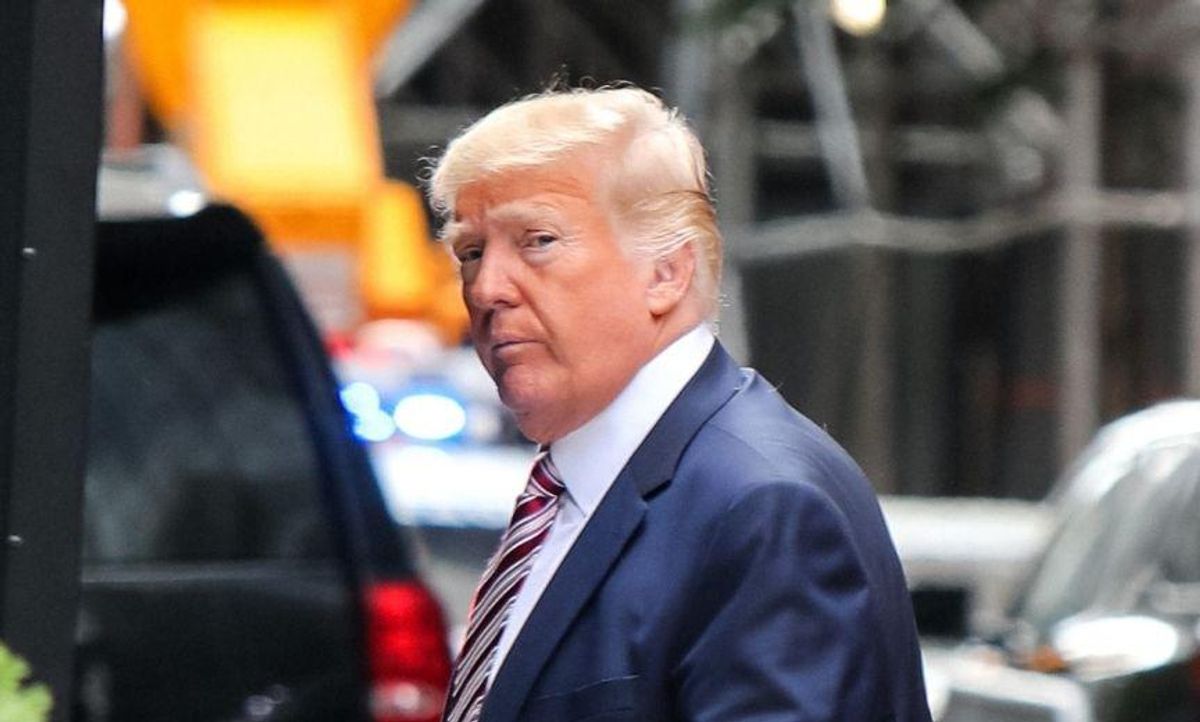absolute immunity
Top stories
Trump Roasted Over Claim of 'Absolute Immunity' From Dem Congressman's Capitol Riot Lawsuit
Throughout his time in the White House, former President Donald Trump frequently used his office to escape accountability for potential crimes.
In 2019, his attorneys argued in court that, as President, Trump could indeed shoot someone on Fifth Avenue and not be subject to charges. In 2020, Trump claimed he had "absolute immunity" from Congressional subpoenas.
He even claimed that Article II of the Constitution gave him unlimited powers, saying:
"Then, I have an Article II, where I have to the right to do whatever I want as president, but I don't even talk about that."
But even without the power of the presidency behind him, Trump continues to claim he's above the law.
In March—two months after Trump's election lies motivated a mob of pro-Trump extremists to storm the United States Capitol in a deadly failed insurrection—Democratic Congressman Eric Swalwell of California sued Trump and his allies for inciting a riot, violating civil rights laws, inflicting emotional distress, and a range of other violations.
In a motion to dismiss the suit, Trump's lawyers argue:
"The claims against former President Trump directly contravene the absolute immunity conveyed on the President by the Constitution as a key principle of separation of powers."
It continues to argue that Trump was free to dispute the standard congressional certification of electoral votes—the process that the Capitol Riots upended:
"While holding that office, former President Trump was free to advocate for the appointment and certification of electors, just as he was entitled to advocate for the passage or defeat of a constitutional amendment, or the reconsideration of a congressional act over his veto even though the President does not directly participate in those congressional acts."
The defense doesn't address that Trump merely disputed the election's results, but that he actively sowed disinformation regarding the electoral process and frequently used violent language in urging his supporters to intercede on his behalf.
Trump's claims of absolute immunity were more of the same—and people widely objected to them.
There is no absolute Presidential Immunity. There is a DOJ policy not to Indict a sitting president. The DOJ polic… https://t.co/nlJQHPnSys— Hank Fiengo (@Hank Fiengo) 1621957730.0
Trump has no immunity whatsoever!! https://t.co/XSB3630gvW— Arriadna 💉➡️🗽🇺🇸 (@Arriadna 💉➡️🗽🇺🇸) 1621956224.0
that is doubtful https://t.co/KOWWLnzabH— James Seramba (@James Seramba) 1621952629.0
And I'm the queen of France. https://t.co/tiaFcCxaXR— Will Savage (@Will Savage) 1621952421.0
https://t.co/0jIAbwt8T0 https://t.co/InofK3bAXt— eric shaw (@eric shaw) 1621951523.0
lol, we shall see won't we? https://t.co/nO0t1voonb— MyaButtreeks (@MyaButtreeks) 1621951141.0
Though Swalwell's suit is still in its early stages, the court of public opinion has largely deemed Trump guilty of inciting the insurrection.
Republican Adam Kizinger: “The American people deserve the truth and my party to this point has said things like it… https://t.co/V97mfMh1E5— Nick Walden Poublon (@Nick Walden Poublon) 1621910806.0
137 Days Since Trump’s Insurrection. https://t.co/KdyQ3AA6jh— VoteVets (@VoteVets) 1621773103.0
Raise your hand if you believe without question Trump incited the insurrection on the US Capitol ✋— Occupy Democrats (@Occupy Democrats) 1621695355.0
Congressional Republicans are currently working to block the formation of a bipartisan commission investigating the insurrection.
 SECONDNEXUS
SECONDNEXUS percolately
percolately georgetakei
georgetakei comicsands
comicsands George's Reads
George's Reads





